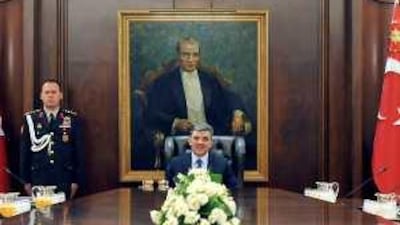ISTANBUL // By signing a controversial bill that gives civilian courts more power to try military personnel, Turkey's president has put the country's EU bid before the interests of the powerful armed forces, ushering in a new era in the delicate relationship between Turkey's civilian and military leadership. Citing Turkey's long-running ambition to join the European Union, Abdullah Gul accepted the law, which was passed by parliament last month, but also asked politicians for additional regulations that would answer some of the concerns expressed by the military.
The government, which had asked Mr Gul to sign the bill while the military lobbied against it, said it would act promptly on the president's demand. But the opposition announced it would ask Turkey's constitutional court to annul the law on the grounds that it violates the constitution, which gives military courts a special status. In a statement issued on Wednesday, the presidential office said the new law had been drawn up in accordance with an EU reform plan that called for the responsibilities of military courts to be limited. The demand for new rules in that area was "mentioned in the Accession Partnership Document issued by the European Union Commission in 2008 and listed among short-term goals that have to be realised before the end of 2009".
Mr Gul's decision, seen as one of the most difficult since he came into office nearly two years ago after the army tried to block him, highlights the ongoing power struggle between the government, which has roots in political Islam, and the military, which sees itself as the guardian of Turkey's secular values and has pushed out four elected governments since 1960. "Tensions between the government and the army and between the president and the army could rise" after Mr Gul's decision, the commentator Ahmet Hakan told the CNN-Turk news channel. Before becoming president, Mr Gul was the foreign minister and a leading member of the ruling Justice and Development Party, or AKP.
The fact that the power and autonomy of Turkey's military, already greatly reduced by a series of legal reforms in recent years, is to be further restricted by the new law has made the bill the number one topic in Ankara. "So far no civilian government has thought about such a step, let alone dared to take it," the veteran commentator Mehmet Ali Birand wrote in the Posta newspaper. "In relations between military and civilians, the balance has begun to tip towards the civilians."
Only two weeks ago, tensions between the government and the military surfaced when a military prosecutor refused to bring charges against a colonel who was accused of signing a secret plan to destabilise the government. Gen Ilker Basbug, the chief of general staff, called the reported plan a worthless "piece of paper" designed to blacken the army's image. But the AKP asked the civilian judiciary to investigate the accusations against the officer, Col Dursun Cicek. The colonel was arrested but quickly released.
Even under current regulations, civilian courts can try military personnel for some serious crimes, but it has been unclear if civilian or military judges have the last word. Several serving and retired officers have been standing trial before a civilian court in Istanbul since last autumn as suspected members of an ultra-nationalist organisation called Ergenekon that prosecutors say wanted to bring down the government of Recep Tayyip Erdogan, the prime minister.
The new law widens the power of civilian courts by stating that it is the task of the civilian judiciary to investigate if members of the military are accused of a serious crime. The regulation puts army members under a kind of civilian control that is completely new for Turkey. Supporters of the law say military courts have been reluctant to hold officers to account. In one famous case, two army officers were sentenced to almost 40 years in prison by a civilian court that found them guilty of a deadly bomb attack in 2005. But when Turkey's appeals court ruled that the case should be heard by a military court, the two men were found not guilty and released by military judges. Under the new law, the case would be firmly in the realm of the civilians.
"Military courts operate within the chain of command," Ahmet Altan, the editor of the Taraf newspaper, the daily that broke the story about the alleged coup plan drawn up by Col Cicek, wrote in a column. "They are not independent." The bill also ends the power of military courts to try civilians. Turkey has been repeatedly criticised by Europe because conscientious objectors who refuse to do their mandatory military service have had to appear in military courts.
There was no immediate reaction by the military after Mr Gul's decision, but the Republican People's Party, or CHP, Turkey's main secular opposition party, which is close to the military, said the law was unconstitutional. "We have no choice but to send [the bill] to the constitutional court," said Onur Oymen, a leading CHP member. tseibert@thenational.ae

